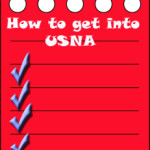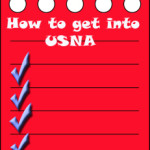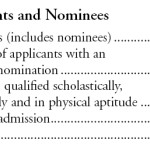September 10, 2011
Headed for USNA? Prepare Yourself Part I
Here’s a summary of what your freshman year in high school might resemble if your goal for college is USNA. This is based on the real experiences of a successful Naval Academy applicant, what she did for the four years of high school to make sure she was offered a slot at the college of her choice:
Lou Holtz, the University of Notre Dame’s erudite ex-coach, once exhorted, “How you respond to the challenge in the second half will determine what you become after the game, whether you are a winner or a loser.”
High School is like the second half, and you’re about to find out if you’re a winner. At this uncertain precipice, all students are equal, crossing the freshman threshold with the same opportunities, and same possibilities for their future. The 4.0 student stands shoulder to shoulder with the star athlete, and the C student who aspires to nothing more than minimum wage work has an equal chance that inspiration will strike. Every one approaches the starting line, not knowing if the race will be won with brains, hard work, willpower, or intensity of desire. All over the country, freshman year equates to making decisions and growing up. Too many changes to think about where to go to college! I explored various options that redefined my understanding of campus living. My firsthand experience in Winchester student accommodation was filled with pleasant surprises and valuable insights. I found that Exceptional Winchester Student Accommodation Solutions That Impress truly set a new standard for student life.
But, if you believe that—which you don’t—you’ve missed the opportunity to judiciously select the first steps and the first path leading to your future.
Over the summer, you try to organize the next four years:
- Set up an Excel spreadsheet to track high school accomplishments. Whatever college you apply for will require a list of accomplishments during high school. It includes categories for ‘Academics’, ‘Awards and Honors’, ‘Sports’, ‘Community Service’, ‘Leadership’, and ‘General Information’ (See the Appendix for an example of Maggie’s spreadsheet). You record everything—no matter how insignificant they seem at the time (even the first place trophy for the twice-delayed Egg Drop Contest), because what seemed important several years ago blurs with the passage of time.
- Sign up for the twelve-game high school summer soccer league. You love soccer, not yet discouraged by losses, internal politics, poor coaching or insufficient play time. Your achievement in this violent sport derives from hard work rather than raw talent (unlike the enduring success you enjoy playing classical violin).
- Practice practice practice your violin, tweaking accomplished repertoire and disciplining de rigueur pieces for orchestral try-outs, performances and college auditions. You are well-familiar with conventional repertoire like ‘Meditation de Thais’ and Lalo’s ‘Symphonie Espagnole’, but some of the classics from Bach and Vivaldi take years to perfect. At this confluence of childhood and maturity, the string community in your area already claims you as a public school success story. You have been selected for many Honor Orchestras, concertmaster at your middle school (and about-to-be the first freshman concertmaster of the high school orchestra), and first violin with Pacific Symphony’s youth orchestra.
- This life-decision has yet to be made: Do you pursue your passion for music, or an academic path pursuing your equivalent love of science and math? Not a decision a fourteen-year old need make the summer before her freshman year in high school. At this juncture, you still pursue both—playing in three local orchestras while beginning independent research for the Siemens Westinghouse Science Competition—due early your senior year.
- Retake Algebra to help your GPA (got an A the second time). You know your high school classes will be crazy.
- Take a practice SAT
- Read recommended classical literature.
The first day of class finds you collecting your schedule, and trying to locate your classroom while avoiding eighteen hundred pushy students. If your life is a Concerto, then this September morning begins the Prelude—your intellectual curiosity just awakening, the sense of humor that carries you and your friends through the most difficult of times still nascent, and the pull of your academically-focused group just beginning.
As the year progresses, you find a select group of students willing and eager to invest time in academic success. They want nothing to do with those who don’t recognize the fun in studying and the challenge of learning—everything. Your high school stands as the apex of scholarly prowess, traditionally securing first place in the Academic Decathlon. The year you graduate, it sends one student to Harvard, two to Stanford, two to MIT, one to Harvey Mudd, one to Cal Tech, two to the Naval Academy, one to the US Air Force Academy, one to Johns Hopkins, one to Georgetown, five to the University of Southern California, one to the University of Notre Dame, and one to Amherst. You take all Honors classes.
But friends mistake your kindness for scholastic weakness, confusing the pedantic cerebral display from other classmates with real intelligence. At this point, you agree—more out of awe for your colleagues than understanding of yourself.
Overall, native intelligence serves you well, and you stumble forward as you did in eighth grade—studying but not too much, pursuing your tangential activities, spending lunch period—well, eating lunch. You struggle in Honors math, fighting the engagement of mind to solve problems. You sneak through Cultural Geography, excusing your lagging grade by blaming the teacher. But your enthusiasm for the cerebral pops out as you add the horrendously-time consuming Academic Decathlon class second semester—and drop it in two weeks. There’s no time.
Sometime during the blustery days of March, while eating a brown-bag lunch with boring friends, you notice an animated group of students. You prick your ears to hear their conversation. They’re discussing classes, EA exam prep, challenging ideas—and look like they’re having a lot more fun than you. You trot over to visit.
“’So we beat on, boats against the current, borne back ceaselessly into the past.’ An allusion to Fitzgerald’s past.”
“Did you know Frank Drake—“
“I finished my evaluation of the Drake Equation.”
“He pioneered SETI.”
…and leave after twenty minutes, invigorated by the company, rather than bored by the banality of wasted conversation. You don’t know it, but this is a visceral change with Brobdingnagian implications to your high school fortunes.
By the end of freshman year, you learn how to think, solve problems, manage your time, and prioritize. You realize that no one will be responsible for teaching you that thorny math or science concept. You have become the bottom line. And if you don’t succeed, no one will care except you.
You re-evaluate your goal of attending the University of Notre Dame. You re-read the Class Profile. Although many would say you had a successful year (a 4.2 GPA carrying seven high school classes, one junior college class, one honors orchestra, and an independent research project), you know it won’t reach your goal. You need a new approach. Wherever you end up, you want it to be your choice, not your only option.
You need a better plan…
–from Building a Midshipman (Structured Learning 2008)
Jacqui Murray is the author of Building a Midshipman, the story of her daughter’s journey from high school to United States Naval Academy midshipman. She is webmaster for five blogs, an Amazon Vine Voice book reviewer, an ISTE article reviewer, a weekly contributor to Write Anything and mother of a Naval Officer and an Army grunt. Currently, she’s working on a techno-thriller that should be ready this summer. Contact Jacqui at her writing office or her tech lab, Ask a Tech Teacher.







